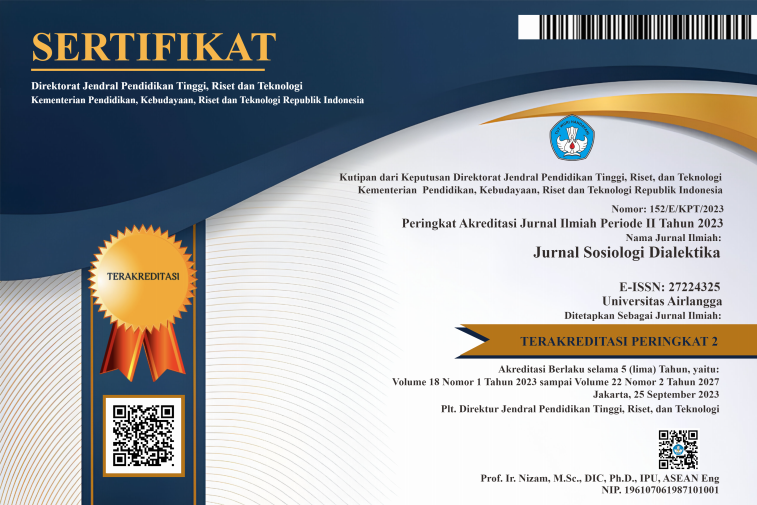Community development through CSR activities of PT Solusi Bangun Indonesia, Tuban Plant in Tuban Regency, East Java, Indonesia
Downloads
The study of Corporate Social Responsibility (CSR) is of paramount importance. Creating a more comprehensive CSR program is a collective necessity for both companies and communities. Companies are expected to actively participate as development actors and to promote community welfare. This study aimed to assess the problems and potential of the community, prioritize CSR development programs, and formulate program recommendations based on the needs of the communities surrounding the company. This study employed qualitative method. The findings indicate personal and structural social issues in six villages within the company’s area. Each village possesses unique potentials that can be developed, including human resources, natural resources, economic resources, infrastructure resources, and social resources. Various programs can be developed based on the potential of each village. To ensure the success and sustainability of the planned CSR programs, an intensive and participatory approach must be undertaken, particularly with the beneficiaries. This approach should aim to foster trust, collaboration, and a shared vision and mission among all stakeholders involved in the program to ensure its success. Consequently, all parties involved can unite to collaboratively achieve the program’s goals and create a positive impact on the community and the surrounding environment.
Abdelhalim K & Eldin AG (2019) Can CSR help achieve sustainable development? Applying a new assessment model to CSR cases from Egypt. International Journal of Sociology and Social Policy 39 (9/10):773-795. https://doi.org/10.1108/IJSSP-06-2019-0120.
Abiddin NZ, Ibrahim I, & Abdul Aziz SA (2022) Non-Governmental Organisations (NGOs) and their part towards sustainable community development. Sustainability 14 (8):4386. https://doi.org/10.3390/su14084386.
Ardle OM & Murray U (2020) Fit for measure? Evaluation in community development. Community Development Journal 56 (3). https://doi.org/10.1093/cdj/bsaa005.
Awuah LS, Amoako KO, Yeboah S, Marfo EO, & Ansu-Mensah P (2021) Corporate Social Responsibility (CSR): Motivations and challenges of a Multinational Enterprise (MNE) subsidiary’s engagement with host communities in Ghana. International Journal of Corporate Social Responsibility 6 (1). https://doi.org/10.1186/s40991-021-00064-8.
Bernados SC & Ocampo L (2023) Exploring the role of social capital in advancing climate change mitigation and disaster risk reduction. Community Development 55 (4):1-21. https://doi.org/10.1080/15575330.2023.2253316.
Bhaktikul K, Aroonsrimorakot S, Laiphrakpam M, & Paisantanakij W (2020) Toward a low-carbon tourism for sustainable development: A study based on a royal project for highland community development in Chiang Rai, Thailand. Environment, Development and Sustainability 23 (7):10743-10762. https://doi.org/10.1007/s10668-020-01083-4.
Boccia F & Sarnacchiaro P (2017) The impact of Corporate Social Responsibility on consumer preference: A structural equation analysis. Corporate Social-Responsibility and Environmental Management 25 (2):151-163. https://doi.org/10.1002/csr.1446.
Chambers R & Conway G (1992) Sustainable Rural Livelihoods: Practical Concepts for the 21st Century (vol 296). Brighton: Institute of Development Studies. 1-29.
de Bakker FGA, Matten D, Spence LJ, & Wickert C (2020) The elephant in the room: The nascent research agenda on corporations, social responsibility, and capitalism. Business & Society 59 (7):1295-1302. https://doi.org/10.1177/0007650319898196.
De Marchi V, Di Maria E, Golini R, & Perri A (2020) Nurturing international business research through global value chains literature: A review and discussion of future research opportunities.International Business Review 29 (5):101708-101708. https://doi.org/10.1016/j.ibusrev.2020.101708.
Donia M, Sirsly C, & Ronen S (2016) Employee attributions of corporate social responsibility as substantive or symbolic: Validation of a measure. Applied Psychology 66 (1):103-142. https://doi.org/10.1111/apps.12081.
Fatima T & Elbanna S (2022) Corporate Social Responsibility (CSR) implementation: A review and a research agenda towards an integrative framework. Journal of Business Ethics 183 (1):105-121. https://doi.org/10.1007/s10551-022-05047-8.
Fernández P, Hartmann P, & Apaolaza V (2021) What drives CSR communication effectiveness on social media? A process-based theoretical framework and research agenda. International Journal of Advertising 41 (3):385-413. https://doi.org/10.1080/02650487.2021.1947016.
Garde-Sanchez R, López-Pérez MV, & López-Hernández AM (2018) Current trends in research on social responsibility in state-owned enterprises: A review of the literature from 2000 to 2017. Sustainability 10 (7):2403. https://doi.org/10.3390/su10072403.
Gozzoli PC, Rongrat T, & Gozzoli RB (2022) Design thinking and urban community development: East Bangkok. Sustainability 14 (7):4117. https://doi.org/10.3390/su14074117.
Grewatsch S & Kleindienst I (2017) When does it pay to be good? Moderators and mediators in the corporate sustainability–corporate financial performance relationship: A critical review. Journal of Business Ethics 145: 383-416. https://doi.org/10.1007/s10551-015-2852-5.
Gulakov I, Vanclay F, & Arts J (2020) Modifying social impact assessment to enhance the effectiveness of company social investment strategies in contributing to local community development. Impact Assessment and Project Appraisal 38 (5):382-396. https://doi.org/10.1080/14615517.2020.1765302.
Halstead JM, Deller SC, & Leyden KM (2021) Social capital and community development: Where do we go from here? Community Development 53 (1):1-17. https://doi.org/10.1080/15575330.2021.1943696.
Hu H, Dou B, & Wang A (2019) Corporate Social responsibility information disclosure and corporate fraud—“risk reduction” effect or “window dressing” effect? Sustainability 11 (4):1141. https://doi.org/10.3390/su11041141.
Jamali A, Wisadirana D, & Yono M (2018) Implementation analysis of Corporate Social Responsibility (CSR) in alleviating poverty at oil-rig location (Case study in Rahayu Village, Soko Sub-District, Tuban Regency). Asian Journal of Humanities and Social Studies 6 (4). https://doi.org/10.24203/ajhss.v6i4.5455.
Kale SS (2020) From company town to company village: CSR and the management of rural aspirations in eastern India’s extractive economies. The Journal of Peasant Studies 47 (6):1211-1232. https://doi.org/10.1080/03066150.2020.1825290.
Kapons M, Kelly P, Stoumbos R, & Zambara R (2023) Dividends, trust, and firm value. Review of Accounting Studies 28: 1354-1387. https://doi.org/10.1007/s11142-023-09795-4.
Kim S (2017) The process model of Corporate Social Responsibility (CSR) Communication: CSR communication and its relationship with consumers’ CSR knowledge, trust, and corporate reputation perception. Journal of Business Ethics 154 (4):1143-1159. https://doi.org/10.1007/s10551-017-3433-6.
Kuswanto K & Anderson I (2023) Structural model of community participation in rural development in Jambi Province, Indonesia. Population and Economics 7 (2):115-141. https://doi.org/10.3897/popecon.7.e97189.
Magrizos S, Apospori E, Carrigan M, & Jones R (2021) Is CSR the panacea for SMEs? A study of socially responsible SMEs during economic crisis. European Management Journal 39 (2):291-303. https://doi.org/10.1016/j.emj.2020.06.002.
Martínez LM & Úcar X (2022) The generation of community social capital in the Poble Sec community plan (Barcelona). Community Development 53 (4):1-22. https://doi.org/10.1080/15575330.2021.1987487.
Matarrita-Cascante D, Lee JH, & Nam JW (2020) What elements should be present in any community development initiative? Distinguishing community development from local development. Local Development & Society 1 (2):1-21. https://doi.org/10.1080/26883597.2020.1829986.
Nayenggita G, Raharjo S, & Resnawaty R (2019) Praktik Corporate Social Responsibility (CSR) di Indonesia. Focus: Jurnal Pekerjaan Sosial 2 (1):61-66. https://doi.org/10.24198/focus.v2i1.23119.
Ngatse-Ipangui R & Dassah MO (2019) Impact of social entrepreneurs on community development in the Cape Town Metropolitan Municipality area, South Africa. The Journal for Transdisciplinary Research in Southern Africa 15 (1). https://doi.org/10.4102/td.v15i1.474.
Paruzel A, Schmidt L, & Maier GW (2023) Corporate social responsibility and employee innovative behaviors: A meta-analysis. Journal of Cleaner Production 393: 136189. https://doi.org/10.1016/j.jclepro.2023.136189.
Purnamawati I, Yuniarta G, & Jie F (2023) Strengthening the role of corporate social responsibility in the dimensions of sustainable village economic development. Heliyon 9 (4):e15115. https://doi.org/10.1016/j.heliyon.2023.e15115.
Rank S & Contreras F (2021) Do millennials pay attention to corporate social responsibility in comparison to previous generations? Are they motivated to lead in times of transformation? A qualitative review of generations, CSR and work motivation. International Journal of Corporate Social Responsibility 6: 1-13. https://doi.org/10.1186/s40991-020-00058-y.
Rudito B, Famiola M, & Anggahegari P (2022) Corporate Social Responsibility and social capital: Journey of community engagement toward community empowerment program in developing country. Sustainability 15 (1):466-466. https://doi.org/10.3390/su15010466.
Russell C (2022) Understanding ground‐up community development from a practice perspective.Lifestyle Medicine 3 (4). https://doi.org/10.1002/lim2.69.
Singhapakdi A, Lee DJ, Sirgy MJ, & Senasu K (2015) The impact of incongruity between an organization’s CSR orientation and its employees’ CSR orientation on employees’ quality of work life. Journal of Business Research 68 (1):60-66. https://doi.org/10.1016/j.jbusres.2014.05.007.
Soesilowati E, Martuti NK, Nugraha SB, & Sidiq WA (2021) Effectiveness of CSR programs in the development of productive economic businesses in Semarang. Jejak (Jurnal Ekonomi Dan Kebijakan) 13 (2):423-432. https://doi.org/10.15294/jejak.v13i2.26768.
Soetomo (2009) Pembangunan Masyarakat: Merangkai Sebuah Kerangka. Yogyakarta: Pustaka Pelajar.
Strange R & Humphrey J (2018) What lies between market and hierarchy? Insights from internalization theory and global value chain theory. Journal of International Business Studies 50 (8):1401-1413. https://doi.org/10.1057/s41267-018-0186-0.
Syarifuddin M (2020) Dampak CSR terhadap kesejahteraan masyarakat binaan ternak PT. PLN Tanjung Jati B. Efficient: Indonesian Journal of Development Economics 3 (1):625-633. https://doi.org/10.15294/efficient.v3i1.35956.
Uzoagu IF (2022) Socio – economic marginalization and youth restiveness, impact on community development in Nigeria. International Journal of Education, Learning and Development 10 (6):1-12. https://doi.org/10.37745/ijeld.2013/vol10n6pp112.
Wang Y, Tai P, & Pang M (2024) Corporate Social Responsibility and corporate fraud: The mediating effect of analyst attention. Finance Research Letters 64: 105370. https://doi.org/10.1016/j.frl.2024.105370.
Wirba A (2023) Corporate Social Responsibility (CSR): The role of government in promoting CSR. Journal of the Knowledge Economy 1-27. https://doi.org/10.1007/s13132-023-01185-0.
Xu S & Liu D (2020) Political connections and corporate social responsibility: Political incentives in China. Business Ethics: A European Review 29 (4):664-693. https://doi.org/10.1111/beer.12308.
Yanfika H, Rangga KK, Viantimala B, Listiana I, Mutolib A, & Rahmat A (2020) Evaluation of the success of programs and strategy for sustainable coastal community development in Tanggamus Regency. Journal of Physics: Conference Series 1467 (1):012026. https://doi.org/10.1088/1742-6596/1467/1/012026.
Youn A, Kim SSK, & Lee H (2023) Corporate social responsibility and customer loyalty: The mediating role of trust. Journal of Retailing and Consumer Services 67: 102962. https://doi.org/10.1016/j.jretconser.2022.102962.

This work is licensed under a Creative Commons Attribution-NonCommercial-ShareAlike 4.0 International License.
1. Copyright of this journal is possession of Editorial Board and Journal Manager, by the knowledge of author, whilst the moral right of the publication belongs to the author.
2. Legal formal aspect of journal publication accessibility refers to Creative Commons Attribution-NonCommercial-ShareAlike (CC BY-NC-SA), implies that publication can be used for non-commercial purposes in its original form (cannot be modified).
3. Every publications (printed/electronic) are open access for educational purposes, research, and library. Other that the aims mentioned above, editorial board is not responsible for copyright violation.















